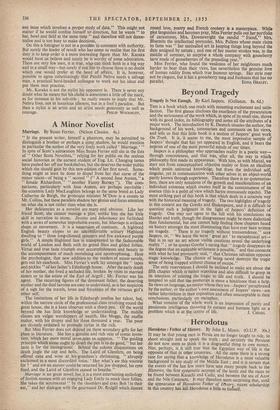Beyond Tragedy
Tragedy Is Not Enough. By Karl Jaspers. (Gollancz. 8s. 6d.) THIS is a book which one reads with mounting excitement and satis- faction. The first glance discloses the excellence of the presentation and the seriousness of the work which, in spite of its small size, shows with its good index, its bibliography and notes all the attributes of a major work. The introduction by K. Deutsch situates the author, the background of his work, summarises and comments on his views, and tells us that this little book is a section of Jaspers' great work On Truth. It is, it seems to me, the most impressive sample of Jaspers' thought that has yet appeared in English, and it bears the imprint of one of the most powerful minds of our times.
Jaspers is a philospher who approaches reality in a poetic way— through concreteness, and that was, after all, the way in which philosophy first made its appearance. With him, as with Marcel, we start not from conceptualised objective reality or from an idealism which posits universal knowledge, but from the individual self, singular, yet in communication with other selves in an object-world partly known through experience. Therefore there is no systematisa- tion, there are only notations of the growth and manifestations of an individual existence which creates itself in the consciousness of its essence (this is a point of view which Sartre strenuously rejects). The most striking part of this book is that which deals in a concrete way with the historical meaning of tragedy. The two highlights of tragedy in this context are the Greeks and Shakespeare, and it is difficult to question such a judgment in the light of Jaspers' definition of tragedy. One may not agree to the full with his conclusions on Hamlet and truth, though the disagreement might be more dialectical than fundamental, but one cannot help finding these chapters based on history amongst the most illuminating that have ever been written on tragedy. " There is no tragedy without transcendence," says Jaspers, or, " We leave the term great art ' to metaphysical art— that is to say an art whose visible creations reveal the-underlying reality " ; or he quotes Goethe's saying that " tragedy disappears to the degree that an equitable settlement is possible," and that connects with what he had previously said, " that Christian salvation opposes tragic knowledge. The chance of being saved destroys the tragic sense of being trapped without chance of escape." The only reservations I should be inclined to make are about the fifth chapter which is rather repetitive and also difficult to grasp in its intention of relating the tragic to life and truth. I should be tempted to add that the postscript is mole a hindrance than a help. Its views on language, no matter whose they are—Jaspers' paraphrased by the author, or the author's own assessment of Jaspers' views—are rather labyrinthine in their exposition and often unacceptable in their conclusions, particularly on metaphor. What remains of the whole work is an impression of purity and passionate intelligence throwing its earnest and humane light on a


































 Previous page
Previous page